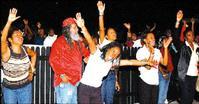
A section of the crowd at the gospel night of the Air Jamaica Jazz and Blues Festival held earlier this year.
-File photo
Teino Evans
, Staff Reporter
AS THE moves and the mannerisms blend, concerns over the increasing similarity between gospel concerts and secular stage shows have been raised.
"Di jump up an down ting an a wave rag inna air, nuh look right fi Christian a do," said one man, who had seen a gospel concert being aired on his cable channel. This he said, resembled a soca fete, where patrons have rags and towels swirling around in the air.
Lauriston Burke-Green, a Christian who enjoys going to gospel clubs and events, says he has no problem with Christians enjoying themselves in the Lord. "I agree that there may be times when they (gospel and secular shows) resemble, but music is amoral (not caring about right and wrong)," he said.
Therefore, Mr. Burke-Green argues, the lyrics that go with the music is what truly matters.
Mr. Burke-Green also said that Jamaican people are naturally rhythmic and will move once they hear the beat of a drum or the strum of a guitar. He said once Christians honour the precepts of God, they need not limit themselves. "We can enjoy music, because it was created by God to enhance worship," Burke-Green said.
Marshall Redwood, owner of popular Christian nightclub 'Prayz House' in Half-Way Tree, says some persons may have the order confused when they say gospel concerts are looking more like secular ones.
"Is long time the world following the church. For example, we will sing a song called Amen and the world models a song off its rhythm to say 'wave dem'," he said. According to Redwood, even if persons don't want to buy his theory, the fact still remains that they are only doing what the Bible says. "We don't do it because the world is doing it, but because the word says it," Redwood said.
Supporting his viewpoint, Redwood said "Psalm 34 talks about lifting up your hands and praising the Lord... Psalm 149 and 150 say praise His name in dance and the Bible also talks about making a joyful noise unto the Lord."
According to Redwood, for too long persons have been slaves to tradition and need to start thinking outside of the box if they are going to win young people over for Christ. He gave his club, where various genres of music are played (gospel songs on dancehall and hip-hop rhythms included) to attract both Christians and non-Christians, as an example. Even gospel artistes who come there to perform, he says, do so on secular rhythms.
Glory Music's Tommy Cowan, who produces the annual gospel festival 'Fun in the Son', says the first time he knew about dancing was from the Bible. "The Bible says dance like David danced, so I don't have a problem with dancing, but it's what's on your mind or what you are dancing for," he said.
According to Cowan, there is, however, a limit to being Christian-like and therefore would not expect to see persons at a gospel event or concert gyrating on each other.
Cowan also feels that it is essential for promoters of gospel events to create an environment that will attract young people to God. "You will always have tradition, but you can't allow that to stop you; some (traditional Christians) don't like the deejaying, rapping and secular rhythms in gospel music, but when Jesus went to save he spoke to them in a manner in which they could understand," he said.
Cowan says sometimes it's not about the music but the message, though there are still inherent limitations. For example, some secular rhythms may have attached themselves to certain slang or have clear sexual
connotation, such as the 'Punaany' rhythm.

















